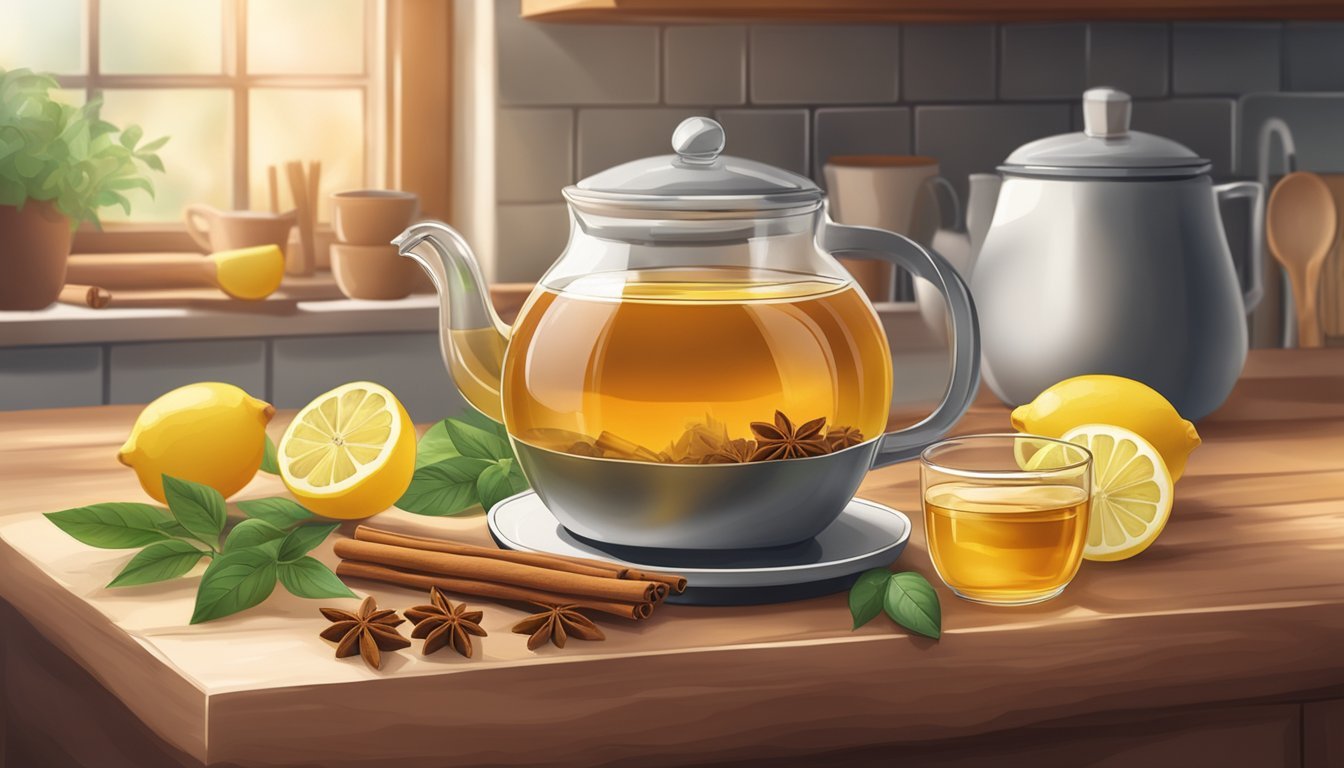Homemade Tea for Colds
Natural Remedies to Soothe and Relieve
This article is part of our series on Natural Health
Discover > Natural Health > Homemade Tea for Colds
During the peak months of cold and flu season, many individuals seek out natural home and herbal remedies to alleviate their symptoms. Homemade tea, in particular, has long been favored for its soothing properties and potential to ease the discomfort associated with respiratory illnesses. With a variety of simple ingredients commonly found in household kitchens, like slices of ginger and organic honey (how long does honey last?), these teas can offer warmth and relief to those suffering from flu symptoms.
Natural ingredients like honey, lemon, ginger, and mint are often incorporated into homemade teas due to their perceived medicinal properties and health benefits. Honey is known for its soothing effect on sore throats, while lemon adds a dose of vitamin C. Ginger is credited with anti-inflammatory properties, and mint can help clear congestion. These ingredients not only contribute to the overall flavor of the tea but are also believed to support the body's immune response.
When it comes to combating the common cold, homemade teas stand out as powerful natural remedies with a range of benefits. These teas, such as honey tea, lemon ginger tea, and garlic tea, not only provide comfort but also pack a punch in terms of health benefits.
Honey tea, known for its antibacterial properties, not only adds sweetness to your cup but also serves as a natural cold remedy. Combined with warm water, it can help soothe a scratchy throat and provide relief.
Lemon ginger tea is another popular choice, offering a powerful antioxidant boost. The combination of lemon's high levels of vitamin C and ginger's antioxidant properties creates a dynamic duo for fighting cold symptoms. This homemade tea is not only soothing but also contributes to overall wellness.
Garlic tea, with its wide range of antibacterial and antiviral activities, is a potent option for battling bacterial infections. Incorporating warm water and garlic into your tea routine can provide relief and support your body's immune system during a cold.
While there is a myriad of over-the-counter cold medicine options that are a remedy for colds, the appeal of a natural and easily accessible remedy is considerable for those preferring a more holistic approach. Homemade teas serve as a comforting alternative, providing symptomatic relief for those under the weather without the need for pharmaceuticals. However, it's important to bear in mind that while such teas can help relieve symptoms, they are not a cure for the cold or flu, which are viral infections that typically resolve on their own with time and rest.
These homemade teas go beyond providing comfort—they harness the natural power of ingredients like honey, lemon, ginger, and garlic to offer a holistic approach to cold relief, combining soothing effects with potent antioxidant and antibacterial properties.
Understanding Colds and Immune Support
Colds are viral infections that primarily affect the respiratory system, and the body's immune response is essential for combating these infections. Adequate intake of vitamins and minerals can be supportive of immune function.
The Role of the Immune System
The immune system serves as the body’s defense mechanism against pathogens like viruses and bacteria. It comprises various cells and tissues that work together to recognize and neutralize foreign invaders. A properly functioning immune system is vital for preventing and fighting off the common cold.
Common Cold vs. Flu
Both the common cold and influenza (the flu) are respiratory illnesses, but they are caused by different viruses. Symptoms of the common cold are generally milder and may include a runny nose, sore throat, and cough. In contrast, the flu is often accompanied by fever, body aches, and severe fatigue. Understanding the differences is crucial for treatment and prevention.
Boosting Immunity with Vitamins and Minerals
Incorporating vitamins and minerals into one's diet can support the immune system’s ability to fight off illnesses.
Vitamin C: An antioxidant that can support immune health. It is commonly found in citrus fruits and is believed to have anti-inflammatory properties.
Zinc Supplements: Zinc plays a pivotal role in maintaining immune function. Deficiencies in zinc can lead to impaired immune responses.
Antioxidants: Compounds that protect the body from oxidative stress, which can harm cells and tissue, thereby supporting overall immune health.
Regular consumption of immune-boosting tea, which often contains a blend of herbs rich in antioxidants and anti-inflammatory agents, may provide some support to the immune system. However, it's essential to consume these nutrients as part of a balanced diet.
Ingredients and Preparations
When creating a homemade tea for colds, selecting high-quality ingredients and understanding the proper preparation techniques are crucial for an effective natural remedy. These teas often include ingredients known for their remedial properties, such as lemon, ginger, and honey.
Selecting Quality Ingredients
The effectiveness of homemade tea relies heavily on the quality of the ingredients used. Seek out organic and fresh products where possible, as they tend to retain more of their beneficial properties.
Honey: Opt for raw honey due to its higher content of beneficial enzymes.
Ginger: Choose fresh ginger root over dried for its potency and essential oils.
Lemon Juice: Freshly squeezed lemon juice is preferred for its vitamin C content.
Elderberry: If available, elderberry can be a powerful addition for its immune-boosting qualities.
Teas: Use loose-leaf teas such as green tea, lemon tea, ginger tea, and echinacea for their natural essence and absence of additional processing.
Tea Making Basics
Proper brewing techniques can enhance the therapeutic qualities of the tea ingredients.
Water Temperature: Use boiling water to steep green tea and elderberry, but slightly cooler water for delicate ingredients like lemon juice to preserve their nutrients.
Steeping Time: Generally, steep for 5-10 minutes. Adjust this time based on the tea type and personal taste preference.
Teapot and Cup: Pre-warm the teapot and cup to maintain the tea's temperature throughout the steeping process.
Remedial Ingredients for Specific Symptoms
For a targeted approach to treating cold symptoms, add specific ingredients to your tea.
Congestion: Ginger and turmeric are known to assist in reducing congestion due to their anti-inflammatory properties.
Sore Throat: Honey and apple cider vinegar (how long does apple cider vinegar last?) provide a soothing coating for a sore throat.
Immune Support: Ingredients like lemon juice and echinacea can boost the immune system.
Antioxidants: Green tea serves as a rich source of antioxidants to aid in recovery.
Using these ingredients and preparation methods can create a comforting homemade tea that not only alleviates symptoms but also promotes overall wellness during a cold.
Popular Homemade Tea Recipes
Homemade tea blends offer comforting warmth and can contribute to wellness, especially during a cold. These tea recipes use natural ingredients, are simple to prepare, and serve as a delightful remedy for soothing a sore throat and supporting the immune system.
Classic Ginger Lemon Tea
Ginger Lemon Tea is renowned for its soothing effect on sore throats and its potential to boost the immune system. To prepare this tea:
Boil 1 cup of water.
Add 1 tablespoon of freshly grated ginger.
Steep for 5 minutes.
Strain into a mug and add the juice of half a lemon.
Sweeten with honey, if desired.
This tea blend combines the spicy kick of ginger with the vitamin C richness of lemon.
Elderberry Echinacea Tea
Elderberry and Echinacea are celebrated for their immune-boosting properties and are often used in herbal teas. Crafting this tea involves:
Boiling 1 cup of water.
Add 1 teaspoon of dried elderberries and 1 teaspoon of Echinacea.
Simmering for 15 minutes.
Straining and serving hot.
Elderberry Echinacea Tea is commonly consumed to fortify the body's defenses during cold seasons.
Spiced Turmeric Tea
Turmeric, with its active ingredient curcumin, is valued for its anti-inflammatory benefits. To make a cup of this warming, spiced tea:
Boil 1 cup of water.
Stir in 1/2 teaspoon of ground turmeric, a pinch of black pepper, and cinnamon to taste.
Allow to steep for 10 minutes.
Strain and add a little fresh honey for sweetness.
This golden tea is not only a pleasure to drink but is also considered a beneficial addition to any homemade tea collection for those seeking comfort from a cold.
Safety and Effectiveness
When considering homemade tea remedies for colds, it is critical to assess their safety and effectiveness. Individuals turn to these remedies to alleviate symptoms such as sore throat, congestion, and pain. The efficacy of herbal ingredients may vary, but many possess anti-inflammatory, antiviral, and expectorant properties that can help reduce phlegm and ease nausea.
Evaluating Home Remedies
Effectiveness: Homemade teas often contain ingredients like ginger, honey, and lemon, which have been traditionally used to soothe a sore throat and relieve congestion. Ginger acts as an anti-inflammatory and can help reduce pain, while honey has antiviral properties and can serve as an expectorant to clear phlegm. Lemon provides vitamin C, which is essential for the immune system.
Antiviral properties: Ingredients such as honey and certain teas may offer antiviral benefits.
Anti-inflammatory action: Compounds in ginger and other herbs may reduce inflammation associated with a cold.
Expectorant effect: Honey may help in loosening and expelling mucus.
Possible Side Effects and Interactions
Safety Concerns: While natural, these ingredients may still cause side effects or interact with conventional medications. For instance, excessive consumption of certain herbs may lead to nausea or gastrointestinal distress.
Acetaminophen or Ibuprofen: Individuals taking over-the-counter medications like acetaminophen or ibuprofen should be cautious of potential interactions with herbal teas.
Pregnancy and allergies: Special populations, such as pregnant women or those with allergies, should consult with healthcare providers before using home remedies.
Side Effects:
Nausea: In excessive amounts, certain herbs may cause nausea.
Allergic reactions: Potential for allergic reactions to specific ingredients, such as herbs or spices.
Consuming homemade teas for cold relief is generally considered safe for most individuals, but it’s important to be informed about the potential side effects and interactions. Personal health conditions and possible allergies should be considered before trying new home remedies.






